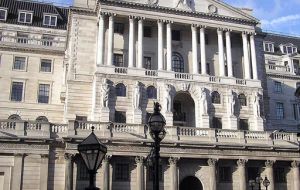MercoPress. South Atlantic News Agency
Bank of England leaves interest rates and liquidity resources unchanged
 UK central bank members are divided over policy to follow
UK central bank members are divided over policy to follow The Bank of England held UK interest rates at a record low and decided not to pump more money into the economy via quantitative easing (QE). The Thursday decision to make no change to policy comes after recent figures on the UK economy showed good growth.
GDP grew at 0.8% in the third quarter - better than expected - and recent manufacturing data was also upbeat. Until these reports some experts had expected there would be more QE.
“Bank of England’s Monetary Policy Committee today voted to maintain the official Bank Rate paid on commercial bank reserves at 0.5%. The Committee also voted to maintain the stock of asset purchases financed by the issuance of central bank reserves at £200 billion”, said the official release.
On Wednesday, the US announced it would make a further 600 billion USD of stimulus available over the next eight months. The move gave worldwide share values a boost on Thursday.
The Bank of England's “no-change” decision was welcomed by lobby groups and economists, but a number of commentators, including the British Chambers of Commerce (BCC) said they thought the UK economy would need its own QE boost n the near future, partly to help smooth the economy through the coming government cuts.
The chief economist at the BCC, David Kern, said: “We believe there are strong arguments for injecting additional QE into the economy over the next few months.
”As VAT increases to 20% in January, and the deficit-cutting program moves to a higher gear in 2011, risks of a setback will inevitably worsen“.
However, Ray Boulger, from mortgage broker John Charcol, said the economic outlook - and therefore any future action by the Bank - was unreadable.
”How the economy performs in 2011 as the impact of the Comprehensive Spending Review progressively bites will be a major factor in determining whether the next move on monetary policy is more easing by increasing the scale of Quantitative Easing, or tightening by increasing the Bank Rate (and perhaps reversing QE),” he said.
Recent meetings have seen growing disagreement among the Bank's Monetary Policy Committee (MPC) members over policy. The vote at the end of the MPC last meeting was a three-way split, minutes revealed. Seven of its members voted for no change to interest rates and no additional stimulus spending, one person wanted to see rates rise, while another member voted to see QE restart.
The minutes to this week's two-day meeting will be published November 17. (BBC).-




Top Comments
Disclaimer & comment rulesCommenting for this story is now closed.
If you have a Facebook account, become a fan and comment on our Facebook Page!